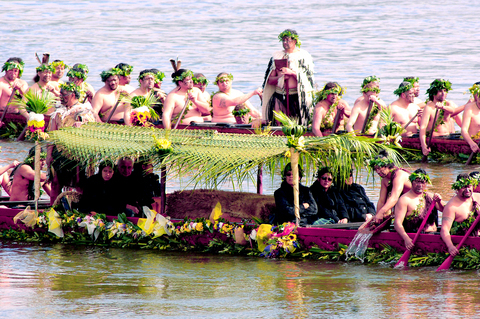Bare-chested warriors in canoes brought the late queen of New Zealand's indigenous Maori to her burial site as haunting notes rang out from conches yesterday, hours after tribal elders named her son as the new monarch.
The events were the culmination of a six-day national mourning period for Queen Te Arikinui Dame Te Atairangikaahu, who died last Tuesday at age 75. Thousands of people have paid their respects for the beloved monarch.
The casket bearing the queen was paddled for several kilometers down the Waikato River in a canoe by warriors in long grass skirts for burial on sacred Taupiri Mountain.

PHOTO: AP
Tribal leaders named the late queen's eldest son, Te Arikinui Tuheitia Paki, as the new Maori king.
King Tuheitia Paki is the seventh Maori monarch from the same family -- a line of sovereigns stretching back to 1858 when Maori selected their first king to unite their tribes as they struggled to retain ownership of their land amid an influx of British immigrants to the then-English colony.
Wearing his mother's feather cloak, Paki, 51, was sat on an ornate carved wooden throne beside her casket shortly before the funeral service began in Ngaruawahia village on North Island.
In his coronation ceremony, he was touched on his head with a Christian Bible in a royal tradition -- the same Bible used to crown the six previous Maori monarchs.
Moments before his crowning, a crowd of thousands was asked whether he should be king. "Ai [yes]," they replied.
Until yesterday a university senior manager and cultural adviser, King Tuheitia has a wife, Te Atawhai, and three children.
Following Maori tradition, the new monarch was named ahead of the start of the queen's funeral ceremonies at Turangawaewae Marae, the tribal meeting place, in Ngaruawahia Village after being chosen by tribal leaders in secret meetings in recent days.
In the funeral procession, a dozen canoes representing all Maori tribes paddled down the river with her casket.
Teams of eight warriors, heads wrapped with mourning wreaths made of leaves, carried the queen's casket shoulder-high from the flax-covered bier up the rugged mountainside to the summit. Ahead of them, teams of young men with ropes attached to the coffin helped lift it up the steep slopes.
Thousands of people lined the foot of the mountain and route to the summit, wailing karakia (mourning calls) and haka (war chants) as the coffin passed, followed by the queen's close family.
The ceremonies were broadcast nationwide on television.
At the funeral service, messages of condolence were read from Britain's Queen Elizabeth II, her son Prince Charles, Pope Benedict XVI and several Pacific Island leaders.
"Dame Te Ata gave a lifetime of service and dedication," Queen Elizabeth said in her message. "Her leadership, dignity and compassion will long be remembered."
Prime Minister Helen Clark was among dignitaries at the service.
Afterward, as the late Queen Te Ata's coffin was closed by attendants, three white doves were released, signifying her departing spirit.
One dove sat on the ground, only flying away after the coffin lid had been closed -- seen by Maori mourners as a sign of the reluctance of their queen to leave them.

A French-Algerian man went on trial in France on Monday for burning to death his wife in 2021, a case that shocked the public and sparked heavy criticism of police for failing to take adequate measures to protect her. Mounir Boutaa, now 48, stalked his Algerian-born wife Chahinez Daoud following their separation, and even bought a van he parked outside her house near Bordeaux in southwestern France, which he used to watch her without being detected. On May 4, 2021, he attacked her in the street, shot her in both legs, poured gasoline on her and set her on fire. A neighbor hearing

DEATH CONSTANTLY LOOMING: Decades of detention took a major toll on Iwao Hakamada’s mental health, his lawyers describing him as ‘living in a world of fantasy’ A Japanese man wrongly convicted of murder who was the world’s longest-serving death row inmate has been awarded US$1.44 million in compensation, an official said yesterday. The payout represents ¥12,500 (US$83) for each day of the more than four decades that Iwao Hakamada spent in detention, most of it on death row when each day could have been his last. It is a record for compensation of this kind, Japanese media said. The former boxer, now 89, was exonerated last year of a 1966 quadruple murder after a tireless campaign by his sister and others. The case sparked scrutiny of the justice system in

DITCH TACTICS: Kenyan officers were on their way to rescue Haitian police stuck in a ditch suspected to have been deliberately dug by Haitian gang members A Kenyan policeman deployed in Haiti has gone missing after violent gangs attacked a group of officers on a rescue mission, a UN-backed multinational security mission said in a statement yesterday. The Kenyan officers on Tuesday were on their way to rescue Haitian police stuck in a ditch “suspected to have been deliberately dug by gangs,” the statement said, adding that “specialized teams have been deployed” to search for the missing officer. Local media outlets in Haiti reported that the officer had been killed and videos of a lifeless man clothed in Kenyan uniform were shared on social media. Gang violence has left

US Vice President J.D. Vance on Friday accused Denmark of not having done enough to protect Greenland, when he visited the strategically placed and resource-rich Danish territory coveted by US President Donald Trump. Vance made his comment during a trip to the Pituffik Space Base in northwestern Greenland, a visit viewed by Copenhagen and Nuuk as a provocation. “Our message to Denmark is very simple: You have not done a good job by the people of Greenland,” Vance told a news conference. “You have under-invested in the people of Greenland, and you have under-invested in the security architecture of this